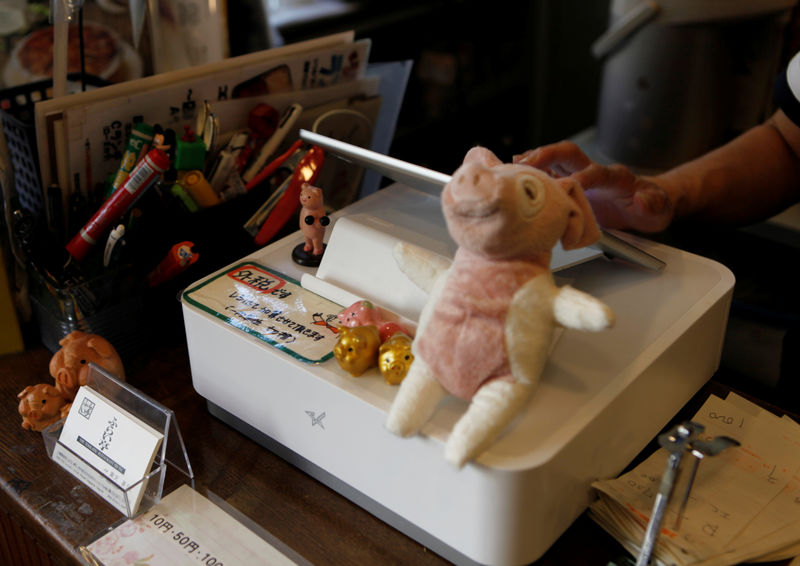By Tetsushi Kajimoto
TOKYO (Reuters) - Motohiro Kurosawa of Fri-tei, a breaded pork cutlet restaurant in Tokyo, has struggled to adjust to steps meant to ease the pain of the tax increase that kicked in on Tuesday.
The nationwide sales tax has risen to 10% from 8%, which Prime Minister Shinzo Abe hopes will support the fast-ageing population and rein in the industrial world's heaviest public debt burden, more than twice the size of Japan's $5 trillion economy.
But some of the ways the government seeks to ease consumer pain, such as premium shopping vouchers, different tax rates and discounts for cashless payments, are creating burdens for businesses, Kurosawa and others said.
At Fri-tei, Kurosawa must handle two tax rates: 8% for take-out and 10% for eat-in.
"It's wrong to set two tax rates. Life would be easier if it's set uniformly," Kurosawa told Reuters ahead of the increase.
Kurosawa in June bought a new electronic cash register system to handle complex transactions, which cost 200,000-300,000 yen.
"It's quite an investment, considering our sales at 33 million yen ($304,990.76) a year," Kurosawa said.
PRICE COMPETITION
On top of the reduced tax rate, the government will offer for the next nine months points redeemable for discounts to shoppers who use cashless payments at small retailers.
The program, together with the reduced tax rate, are expected to spur a price competition among businesses that lack bargaining power with customers accustomed to decades of deflation. The government has set aside 2 trillion yen for such stimulus.
Some major convenience store operators are already offering discounts for cashless payment. And other retailers are simply reducing prices to lure customers.
"This could spark stiff price competition and induce deflation. Small firms that lack competitiveness will be forced out of business," Yukio Kawano, the head of Japan Supermarket Association, told Reuters.
10% OR 8%?
The Sukiya restaurant chain has kept the tax-included price of its regular gyudon bowl of rice topped with beef unchanged at 350 yen despite the higher 10% sales tax rate. McDonald's Japan (T:2702) has also kept eat-in prices for about 70 percent of its menu unchanged.
That makes things easier for consumers but squeezes profits, Kawano warned.
A midsize supermarket chain, Yaoko Co., has been preparing for the tax increase for a year, including getting new cash registers at a cost of 700 million yen. It also retrained employees, coordinated with 300 business partners and revised prices.
"Even sales clerks at our supermarkets are still confused on which items are subject to a lower tax rate," said Yukio Tanita, general manager of sales strategy at Yaoko.
For example, he said, sweet sake is considered alcohol and will be taxed at 10%, but sweet sake flavoring is only taxed at 8%. Toothpaste is subject to the 10% tax rate, but breath-care tablets are taxed at 8%.
"Taking labor expenses into account, it costs a lot," Tanita said. "It's hard to secure manpower at a time of labor shortages."
(This story has been refiled to add dropped word in Paragraph 2)
